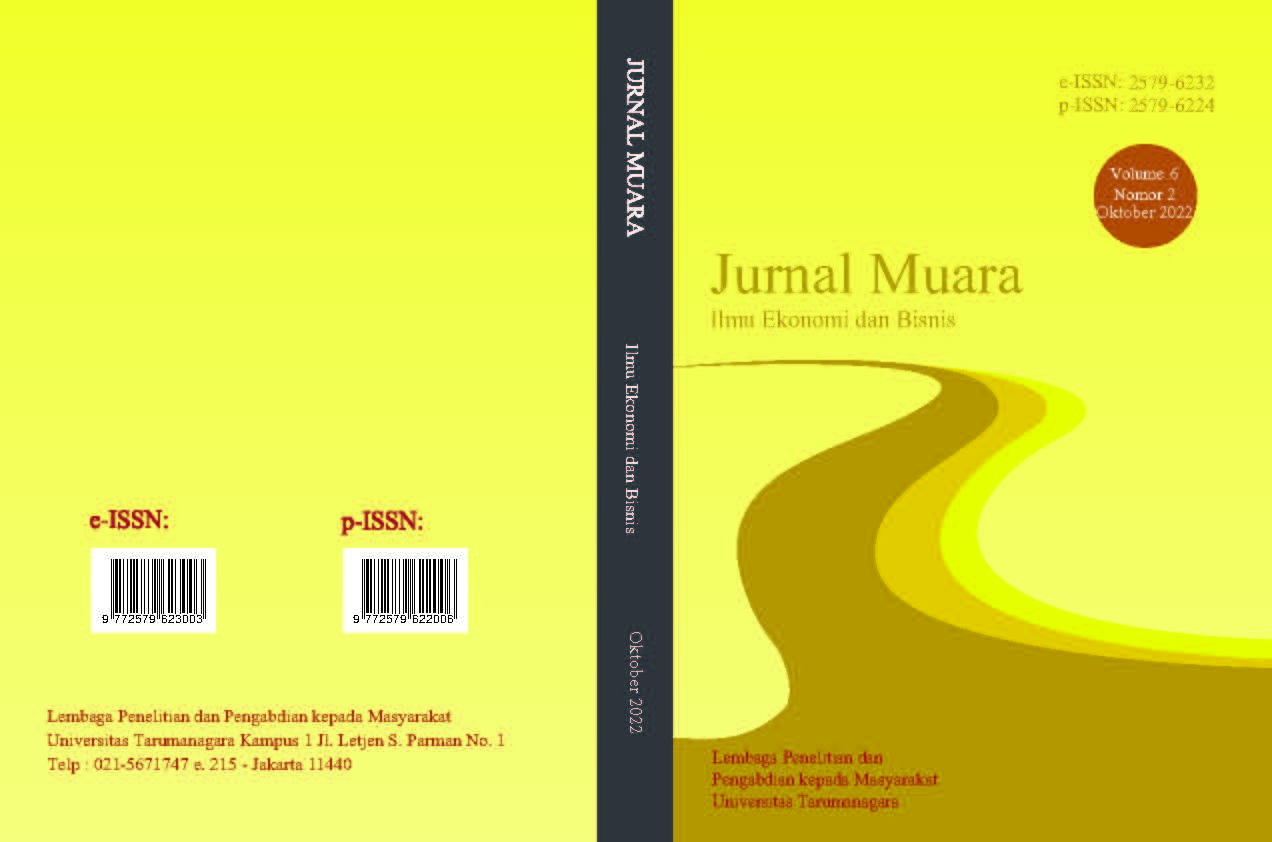PENGARUH EFIKASI DIRI DAN PERILAKU KEWARGAAN ORGANISASIONAL TERHADAP STRES KERJA DENGAN WELL-BEING SEBAGAI VARIABEL MEDIASI
Main Article Content
Abstract
Beberapa penelitian menunjukkan bahwa sebagian besar karyawan menghadapi stres yang cukup tinggi dalam menjalankan pekerjaannya. Stres yang tinggi dapat mengakibatkan kesulitan untuk fokus terhadap pekerjaannya. Tujuan penelitian ini adalah untuk mengetahui pengaruh efikasi diri, perilaku kewargaan organisasional, dan well-being terhadap stres kerja. Purposive sampling digunakan sebagai teknik pengambilan sampel yang digunakan dalam penelitian ini. Sampel penelitian adalah sebanyak enam puluh dua orang karyawan pada beberapa perusahaan swasta di Jakarta Barat. Data penelitian diolah dengan menggunakan SmartPLS. Hasil penelitian yang didapat menunjukkan efikasi diri tidak memiliki pengaruh terhadap stres kerja, perilaku kewargaan organisasional memiliki pengaruh negatif dan signifikan terhadap stres kerja, well-being memiliki pengaruh negatif dan signifikan terhadap stres kerja. Selain itu dapat disimpulkan juga bahwa well-being tidak memberikan pengaruh dalam memediasi pengaruh efikasi diri terhadap stres kerja serta well-being memberikan pengaruh yang signifikan dalam memediasi pengaruh perilaku kewargaan organisasional terhadap stres kerja.
Several studies have shown that most employees face quite high stress in carrying out their work. High stress can make it difficult to focus on their work. The purpose of this study was to determine the effect of self-efficacy, organizational citizenship behavior, and well-being on work stress. Purposive sampling was used as a sampling technique used in this study. The study sample was sixty-two employees at several private companies in West Jakarta. The research data was processed using SmartPLS. The results of the study obtained showed that self-efficacy has no influence on work stress, organizational citizenship behavior has a negative and significant influence on work stress, well-being has a negative and significant influence on work stress. In addition, it can also be concluded that well-being does not have an influence in mediating the influence of self-efficacy on work stress and well-being has a significant influence in mediating the influence of organizational citizenship behavior on work stress.
Article Details
Section

This work is licensed under a Creative Commons Attribution-NonCommercial-ShareAlike 4.0 International License.
This work is licensed under a Jurnal Muara Ilmu Ekonomi dan Bisnis Creative Commons Attribution-ShareAlike 4.0 International License.References
Chee, C. L., Shorty, G., & Kurpius, S. E. R. (2019). Academic stres of Native American un-dergraduates: The role of ethnic identity, cultural congruity, and self-beliefs. Journal of Diversity in Higher Education, 12(1), 65–73. https://doi.org/10.1037/dhe0000094
Edgar, F., Geare, A., Saunders, D., Beacker, M., & Faanunu, L. (2017). A transformative service research agenda: a study of workers’ well-being. The Service Industries Journal, 37(1), 84–104. https://doi.org/10.1080/02642069.2017.1290797
Hair, J., Hult, G., Ringle, C. & Sarstedt, M. (2017). A primer on partial least squares structural equation modelling (PLS-SEM). 2nd edition. London: SAGE.
Hitches, E., Woodcock, S., & Ehrich, J. (2022). Building self-efficacy without letting stres knock it down: stres and academic self-efficacy of university students. International Journal of Educational Research Open, 3, 100124.
Karatepe, O. M., Yavas, U., Babakus, E., & Deitz, G. D. (2018). The effects of organizational and personal resources on stres, engagement, and job outcomes. International Journal of Hospitality Management, 74, 147–161. https://10.1016/j.ijhm.2018.04.005.
Kim, Eun-Jee dan Park, Sunyoung (2019). The role of transformational leadership in citizenship behavior organizational learning and interpersonal trust as mediators. International Journal of Manpower, 40 (7). 1347-1360.
Mugiono, M., Purwoko, B. H., Soelton, M., & Yuvitasari, R. (2020). Recognizing how the job involvement, burnout, and self-efficacy work influences the work stres at international hospitals. In 4th International Conference on Management, Economics and Business (ICMEB 2019), 2, 264-270.
Mugiyatun, M. & Khafid, M. (2020). Pengaruh prakerin, pendidikan kewirausahaan, dan lingkungan keluarga dengan self efficacy sebagai variabel intervening terhadap minat berwirausaha. Economic Education Analysis Journal, 9(1), 100-118. https://doi.org/10.15294/eeaj.v9i1.37233
Otalora, M. L., Garcia, N. P., Sanchez, I. D. (2020). Interpersonal conflict at work and knowledge hiding in service organizations: the mediator role of employee well-being. International Journal of Quality and Service Sciences, 13(1), 63-90. https://doi.org/10.1108/IJQSS-02-2020-0023
Pemayun, I. N. G. T., & Wibawa, I. M. A. (2017). Pengaruh stres kerja dan budaya organisasi terhadap organizational citizenship behavior. E-Jurnal Manajemen Universitas Udayana, 6(9), 5088-5115.
Ripaldi, A., Marnis, M., & Restu, R. (2017). Pengaruh kepuasan kerja dan organizational citizenship behavior terhadap stres kerja dan retensi karyawan di PT Multi Auto Intrawahana Pekanbaru. JOM FEKON, 4(1), 518-532.
Rubiyandono, A. P. (2019). Analisis efek organizational citizenship behavior dan komunikasi organisasi terhadap stres kerja. Jurnal Akuntansi Bisnis, 17(1), 30-44.
Sekaran, U., & Bougie, R. (2016). Research methods for business: A skill building approach. John Wiley & Sons.
Tongchaiprasit, P., & Ariyabuddhiphongs, V. (2016). Creativity and turnover intention among hotel chefs: The mediating effects of job satisfaction and job stres. International Journal of Hospitality Management, 55, 33–40. https://doi.org/10.1016/j.ijhm.2016.02.009
Yu, J., Park, J., & Hyun, S. S. (2021). Impacts of the COVID-19 pandemic on employees’ work stres, well-being, mental health, organizational citizenship behavior, and employee-customer identification. Journal of Hospitality Marketing & Management, 30(5), 529-548. https://doi.org/10.1080/19368623.2021.1867283
Yu, X., Wang, P., Zhai, X., Dai, H., & Yang, Q. (2015). The effect of work stres on job burnout among teachers: The mediating role of self-efficacy. Social Indicators Research, 122(3), 701-708.
Zheng, X., Zhu, W., Zhao, H. and Zhang, C. (2015). Erratum: Employee well-being in organizations: Theoretical model, scale development, and cross-cultural validation. Journal of Organizational Behavior, 36 (5), 645–647. https://doi.org/10.1002/job.1990



